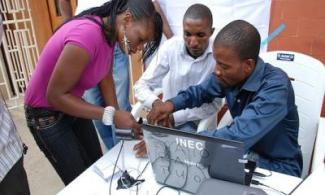
Investigations by SaharaReporters reveal that officials of the Independent National Electoral Commission are out to mislead the public regarding the agency’s plan to use a manual register for the April polls.
googletag.cmd.push(function() { googletag.display('content1'); });
Investigations by SaharaReporters reveal that officials of the Independent National Electoral Commission are out to mislead the public regarding the agency’s plan to use a manual register for the April polls.
Yesterday, Kayode Idowu, a spokesman for INEC chairman Attahiru Jega, issued a statement denying that the agency planned to jettison the recent register compiled through electronic means and to adopt a manual register.
However, several sources within INEC have disclosed that the commission was engaged in massive public deception whilst toeing the line of discredited former INEC chairman Maurice Iwu.
Mr. Idowu’s statement asserted that “the new voter register to be used is the one compiled electronically using the DDCMs,” adding that “INEC is making this clarification in the hope that it will assuage agitation in the public over alleged recourse by the Commission to a ‘manual register’ to the exclusion of the ‘electronic register.’”
But our sources said there were glaring holes in Mr. Idowu’s claims. The sources, several of them staff of the commission, disclosed that the data generated during the voter registration exercise was deeply flawed and inflated to facilitate rigging.
They revealed that the N87 billon spent by INEC on registration of voters was a colossal waste of funds since the agency had so far failed to verify the figures by subjecting them to appropriate audit. “In the end, INEC will essentially use a ‘manual register’ in the upcoming general elections just as Professor Iwu did,” said one of the sources.
INEC is billed to release the voter register tomorrow, March 2nd, according to its calendar. Our sources indicate that it was only in a handful of states that INEC had been compelled to weed out fake registered voters as well as voters who engaged in multiple registrations.
“The roster of voters recently released by INEC is significantly inflated, and that’s precisely because the agency failed to submit the data to the Automatic Finger Identification System (AFIS) audit,” said one source.
When current INEC chairman, Attahiru Jega, requested and got a huge amount of money for voters registration, he claimed that the agency was going to use electronic registration to eliminate fake voters and enable Nigerians to participate in reliable polls based on "one-person-one-vote".
But sources within INEC in Abuja told SaharaReporters that the goals spelt out by Mr. Jega had been sacrificed. “Only a handful of states were able to process their voters registers through the AFIS process which is meant to eliminate registered voters whose biometric data were not captured during the registration process,” said one source. He added that INEC needs an additional 15 days to ensure that AFIS is used to validate the data from all the states, but that Mr. Jega had decided to forego this important audit in order to meet a requirement of the electoral law that the voter register must be submitted 30 days before the election.
Our sources suggested that, had INEC applied the AFIS process, the commission would have halved the 67 million voters the agency gave as the figure of registered voters. “That number is bogus, pure and simple,” said another source, “and Professor Jega knows it.”
Our sources revealed that the application of AFIS audit in a few states and regions of Nigeria had exposed and shattered longstanding demographic misrepresentations across the country.
One source said that some top politicians, especially in the PDP, who want the bloated figures for ease of rigging, pressured INEC officials to abandon further audits and to adopt the "raw register" as recorded by the DDC machines.
“The [voters] register as it stands now is essentially a rigging manual register for the ruling party,” said a source.
The manual register would offer advantages to the politicians who recruited underage voters, financed multiple registrations or who registered non-existent people in their bedrooms and held on to those voting cards.
A source within INEC said that the leaders of some civil society groups involved in election monitoring were aware of the ongoing fraud, “but have chosen to remain silent because many of them have received grants from INEC.”
googletag.cmd.push(function() { googletag.display('comments'); });
googletag.cmd.push(function() { googletag.display('content2'); });